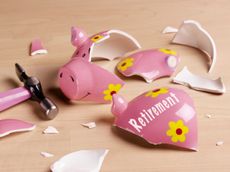The Risk You Face If You Receive Equity Compensation
Anyone who receives non-cash pay like stock options or restricted stock needs to understand, and heed, a major danger to their investment portfolio and their retirement security: concentration risk.

Equity compensation can be an extremely useful tool when it comes to building wealth. And just like any other tool you may use, you can learn how to leverage it to build something great — or you can mishandle it and end up with a poor outcome.
Some employers offer equity compensation in addition to regular paychecks or bonuses as part of the total compensation package for key, valuable employees. This is one way companies incentivize top performers to keep performing well, since employees are able to share in the success of the business as a whole. It can also act as a means for the company to retain talent (since most equity comp comes with a vesting schedule, meaning the employee must remain with the company for a set period of time before they can claim the equity they earned).
There are many types of equity compensation that you could receive: Incentive stock options, non-qualified stock options and restricted stock units are some of the most common forms of equity. You might also be able to participate in an ESPP, or employee stock purchase plan, as part of your compensation package.

Sign up for Kiplinger’s Free E-Newsletters
Profit and prosper with the best of expert advice on investing, taxes, retirement, personal finance and more - straight to your e-mail.
Profit and prosper with the best of expert advice - straight to your e-mail.
One of the biggest issues that most people don’t take into consideration when they receive some form of equity compensation is concentration risk. Whenever you hold a large amount of a single stock position, you increase your concentration risk and therefore the overall risk inherent in your investment portfolio. This can become especially problematic if you hold a lot of stock from a single company that also happens to pay your salary.
The rule of thumb I provide to my clients is to keep their exposure to any single stock position to no more than 5% of their liquid net worth. There are exceptions, of course, but in general, this provides a good guideline to use. Unfortunately, people struggle to stick to this rule for a number of reasons, ranging from feeling loyal to their company to simply failing to understand that regardless of how they feel about concentration risk, they actually can’t afford to take it.
To help you take on the right amount of risk (concentrated or otherwise), here’s what you need to think through if you have equity compensation.
Whether You Hold Company Shares or Not Shouldn’t Be About the Company Itself
When it comes to equity compensation (or any single stock position, for that matter), it’s often tough to separate short-term circumstances from the bigger, broader, long-term perspective. But it is critical to do that, so you can make decisions that make sense in the context of your entire financial plan. That means you have to think through the choices with this specific aspect of your finances that will allow for the best probability to grow — and maintain — your entire net worth and investment portfolio as a whole.
When I advise my clients to reduce their exposure to their company stock through equity compensation, that recommendation has little to do with their company itself (and how anyone feels about the company) and whatever might be happening right now, and everything to do with concentration risk.
That’s often hard to hear, because clients often feel loyal to their employers. They may feel shedding company stock is a betrayal of a business they feel passionately about. Or, because they do work for the company, from their perspective the value can only go up because things are going great. And that might be true: Your company could very well be poised to explode in growth and therefore value. As the company’s value rises, you, as an employee who holds equity, could benefit from that success, too.
There is no denying that equity compensation is one way to exponentially grow wealth. And yet … when you have a significant amount of money tied up in one company, putting your feelings over your financial plan is a massive risk to take.
Here’s the bottom line that most people miss in this debate: There is a difference between “generating the most money possible” and “generating the level of wealth you need to reach your stated goals and desires.”
When You Can’t Actually Afford to Take Risks (Even If You’re Emotionally Able to Handle It)
The difference is the risk you take. Generating the most money possible requires that you take more risks than generating a sufficient amount of wealth to meet your goals and live the way you want.
Taking on more risk is fine if losing your money is something you can afford to do. In this case, “afford” means losing what you have tied up in the riskier position and having enough wealth elsewhere that the loss does not affect your ability to meet your goals and live the way you want.
So ask yourself: If you lost the investment you had in your company through a concentrated position created by your equity compensation — and potentially your income along with it — would it be a severe blow to your ability to reach your goals and afford your lifestyle now and in the future?
Remember too that there is a difference between risk tolerance, or how you feel about risk, and risk capacity, which is your actual ability to take risks without putting yourself in a position that you cannot recover from.
When you find yourself in a situation where the downside risk could devastate your ability to be financially successful, it doesn’t matter how you feel about the investment. It’s a bit of a moot point about how well it could do because it’s not something you can afford to do, if you cannot adequately recover from realizing a loss.
Consider the Recent Case of Uber
This isn’t just hypothetical. This can and does happen in the real world, and we just witnessed it with Uber in the spring of 2020. Because of the COVID-19 pandemic, stock prices dropped and Uber laid off thousands of workers. If the employees with equity compensation packages were included in those layoffs, they just lost their incomes and a lot of investment portfolio value.
If this happened to you, how financially devastated would you be by this outcome?
This is just one example — and that’s not to say this is what will happen to everyone who has equity compensation and holds more than 5% of their liquid net worth in their employer’s stock. We have no idea how individual company performance will be in the future, for better or worse.
And that is exactly why the focus on diversification is so important, because it protects against an unknown and a risk that you couldn’t truly afford to take if the loss of both your income and a huge portion of your net worth would mean not being able to meet your short- or long-term goals.
Keep the Focus on Your Goals, Not the Hopes of a Home Run
None of this is to say equity compensation is a bad thing — it certainly isn’t! It’s truly a great opportunity for you as an employee to add to your wealth-building firepower. But you must understand how to manage this benefit wisely. For most people, that means keeping a careful eye on the concentration risk that it can introduce into your portfolio if you begin building up large amounts of a single stock (especially when that single stock is tied to the company that also writes your paychecks).
If your goal is to increase your probability of a successful outcome — which, for most people, means having money for your long-term goals and an ability to fund your lifestyle without running out of money in your lifetime — then seek to set up a systematic, unemotional investment plan that divests away from concentrated stock positions and into a diversified portfolio.
While the potential for home runs and having your company be the next Apple is a much sexier-sounding strategy, it might not be one that is best for you to pursue. Even if a diversified portfolio ended up providing you with less money than holding stock in your company if it exponentially increased in value over time, that’s OK … and that’s probably the hardest thing to understand about all of this.
Remember, the point is not to end up with the most money possible. You don’t need your investment portfolio to consistently outperform. What you need is a reliable way to earn enough of a return to achieve your goals without taking on excessive risk. In this case, excessive risk is the downside potential of a company doing poorly, trailing returns of a diversified portfolio, or failing altogether.
Managing risk isn’t always sexy. But doing so is critical because it helps you avoid risks that you can’t actually afford to take, or recover from — and it certainly is a smart way to ensure you’re financially successful over time.
Get Kiplinger Today newsletter — free
Profit and prosper with the best of Kiplinger's advice on investing, taxes, retirement, personal finance and much more. Delivered daily. Enter your email in the box and click Sign Me Up.

Eric Roberge, CFP®, is the founder of Beyond Your Hammock, a financial planning firm working in Boston, Massachusetts and virtually across the country. BYH specializes in helping professionals in their 30s and 40s use their money as a tool to enjoy life today while planning responsibly for tomorrow. Eric has been named one of Investopedia's Top 100 most influential financial advisers since 2017 and is a member of Investment News' 40 Under 40 class of 2016 and Think Advisor's Luminaries class of 2021.
-
 Need More Money for Retirement? You May Have Already Saved It.
Need More Money for Retirement? You May Have Already Saved It.Over 29 million lost 401(k) accounts worth almost $1.65 trillion have been forgotten by their owners. Here are eight ways you can locate your account.
By Donna LeValley Published
-
 Five Ways to Save for Retirement in 2025
Five Ways to Save for Retirement in 2025If you did a poor job saving for retirement last year, don't despair. There are ways to build your nest egg in the new year.
By Donna Fuscaldo Published
-
 The Wrong Money Question to Ask After Trump's Election
The Wrong Money Question to Ask After Trump's ElectionIf you're wondering what moves to make with a new president moving into the White House, you're being dangerously shortsighted. Here's what to do instead.
By George Pikounis Published
-
 An Investing Plan for This Year: Doing Less Can Lead to More
An Investing Plan for This Year: Doing Less Can Lead to MoreAchieve more when investing in 2025 by planning to work smarter, not harder. These three strategies can help put you on the right track and keep you there.
By David Booth Published
-
 All About Six Types of Auto Insurance Coverage
All About Six Types of Auto Insurance CoverageDo you know what your auto insurance policy covers? Here's a primer on some coverage categories, along with examples of how each type of coverage works.
By Karl Susman, CPCU, LUTCF, CIC, CSFP, CFS, CPIA, AAI-M, PLCS Published
-
 Social Security and Medicare Funding: Is the Sky Falling?
Social Security and Medicare Funding: Is the Sky Falling?Social Security and Medicare are slowly running out of money, but what does that mean for the retirees counting on them? Actually, it's not all bad news.
By Jared Elson, Investment Adviser Published
-
 What We Need to Do to Protect Retirees' Financial Security
What We Need to Do to Protect Retirees' Financial SecurityCognitive decline and aging in general put older retirees at risk of losing their financial security when they're the most vulnerable. What can be done?
By Margaret Franklin, CFA Published
-
 Is Money Messing Up Your Family's Life?
Is Money Messing Up Your Family's Life?Parents who discuss money and attitudes toward money with their children are more likely to raise financially successful and responsible adults.
By H. Dennis Beaver, Esq. Published
-
 Do You Know the Power of Whole Life Insurance in Retirement?
Do You Know the Power of Whole Life Insurance in Retirement?Worried about legacy planning, market volatility or where to get cash to cover surprise medical or home repair bills? This little-known tool could help.
By John L. Smallwood, CFP® Published
-
 10 Ways Retirees Can Manage Income Distribution
10 Ways Retirees Can Manage Income DistributionThe goal of a retirement income plan is to make the most of your money while ensuring that it lasts. These 10 strategies can help secure your financial future.
By John L. Smallwood, CFP® Published